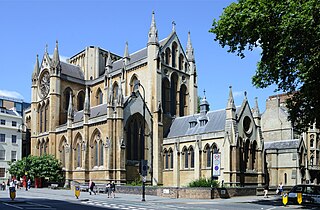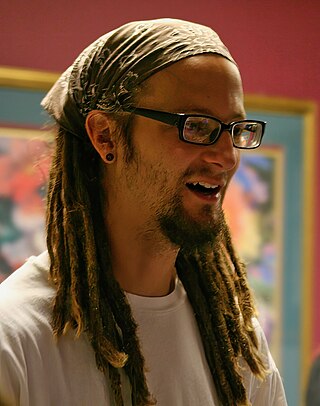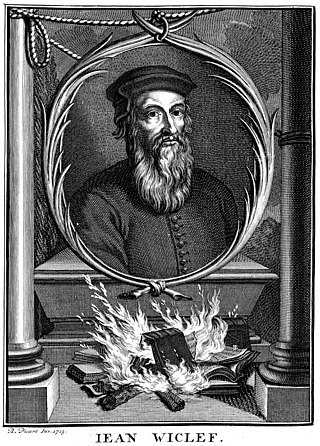Related Research Articles

The Eucharist, also known as Holy Communion, Blessed Sacrament and the Lord's Supper, is a Christian rite that is considered a sacrament in most churches, and as an ordinance in others. Christians believe that the rite was instituted by Jesus at the Last Supper, the night before his crucifixion, giving his disciples bread and wine. Passages in the New Testament state that he commanded them to "do this in memory of me" while referring to the bread as "my body" and the cup of wine as "the blood of my covenant, which is poured out for many". According to the Synoptic Gospels this was at a Passover meal.
Monasticism, also called monachism or monkhood, is a religious way of life in which one renounces worldly pursuits to devote oneself fully to spiritual work. Monastic life plays an important role in many Christian churches, especially in the Catholic, Orthodox and Anglican traditions as well as in other faiths such as Buddhism, Hinduism, and Jainism. In other religions, monasticism is criticized and not practiced, as in Islam and Zoroastrianism, or plays a marginal role, as in modern Judaism.

The empty tomb is the Christian tradition that the tomb of Jesus was found empty after his crucifixion. The canonical gospels are consistent on the incident, with variations, of the visit of women to Jesus' tomb. Although Jesus' body had been laid out in the tomb after crucifixion and death, the tomb is found to be empty, the body gone, and the women are told by angels that he has risen. The gospel accounts are based on earlier oral traditions.

In Christianity, an anchorite or anchoret is someone who, for religious reasons, withdraws from secular society to be able to lead an intensely prayer-orientated, ascetic, or Eucharist-focused life. Anchorites are frequently considered to be a type of hermit, but unlike hermits, they were required to take a vow of stability of place, opting for permanent enclosure in cells often attached to churches. Also unlike hermits, anchorites were subject to a religious rite of consecration that closely resembled the funeral rite, following which they would be considered dead to the world and a type of living saint. Anchorites had a certain autonomy, as they did not answer to any ecclesiastical authority apart from bishops.

Christian communism is a theological view that the teachings of Jesus compel Christians to support religious communism. Although there is no universal agreement on the exact dates when communistic ideas and practices in Christianity began, many Christian communists argue that evidence from the Bible suggests that the first Christians, including the Apostles in the New Testament, established their own small communist society in the years following Jesus' death and resurrection. Many advocates of Christian communism and other communists, including Karl Kautsky, argue that it was taught by Jesus and practised by the apostles themselves. This is generally confirmed by historians.

The Catholic Apostolic Church (CAC), also known as the Irvingian Church or Irvingite Church, is a denomination in the Restorationist branch of Christianity. It originated in Scotland around 1831 and later spread to Germany and the United States. The tradition to which the Catholic Apostolic Church belongs is sometimes referred to as Irvingism or the Irvingian movement after Edward Irving (1792–1834), a clergyman of the Church of Scotland credited with organising the movement.

Christian mysticism is the tradition of mystical practices and mystical theology within Christianity which "concerns the preparation [of the person] for, the consciousness of, and the effect of [...] a direct and transformative presence of God" or Divine love. Until the sixth century the practice of what is now called mysticism was referred to by the term contemplatio, c.q. theoria, from contemplatio, "looking at", "gazing at", "being aware of" God or the Divine. Christianity took up the use of both the Greek (theoria) and Latin terminology to describe various forms of prayer and the process of coming to know God.

The real presence of Christ in the Eucharist is the Christian doctrine that Jesus Christ is present in the Eucharist, not merely symbolically or metaphorically, but in a true, real and substantial way.

Christian monasticism is the devotional practice of Christians who live ascetic and typically cloistered lives that are dedicated to Christian worship. It began to develop early in the history of the Christian Church, modeled upon scriptural examples and ideals, including those in the Old Testament, but was not mandated as an institution in the scriptures. It has come to be regulated by religious rules and, in modern times, the Canon law of the respective Christian denominations that have forms of monastic living. Those living the monastic life are known by the generic terms monks (men) and nuns (women). The word monk originated from the Greek μοναχός, itself from μόνος meaning 'alone'.

The Desert Fathers or Desert Monks were early Christian hermits and ascetics, who lived primarily in the Scetes desert of the Roman province of Egypt, beginning around the third century AD. The Apophthegmata Patrum is a collection of the wisdom of some of the early desert monks and nuns, in print as Sayings of the Desert Fathers. The first Desert Father was Paul of Thebes, and the most well known was Anthony the Great, who moved to the desert in AD 270–271 and became known as both the father and founder of desert monasticism. By the time Anthony had died in AD 356, thousands of monks and nuns had been drawn to living in the desert following Anthony's example, leading his biographer, Athanasius of Alexandria, to write that "the desert had become a city." The Desert Fathers had a major influence on the development of Christianity.
Christian vegetarianism is the practice of keeping to a vegetarian lifestyle for reasons connected to or derived from the Christian faith. The three primary reasons are spiritual, nutritional, and ethical. The ethical reasons may include a concern for God's creation, a concern for animal rights and welfare, or both. Likewise, Christian veganism is not using any animal products for reasons connected to or derived from the Christian faith.

Memorialism is the belief held by some Christian denominations that the elements of bread and wine in the Eucharist are purely symbolic representations of the body and blood of Jesus Christ, the feast being established only or primarily as a commemorative ceremony. The term comes from the Gospel of Luke 22:19: "Do this in remembrance of me", and the attendant interpretation that the Lord's Supper's chief purpose is to help the participant remember Jesus and his sacrifice on the Cross.
New Monasticism is a diverse movement, not limited to a specific religious denomination or church and including varying expressions of contemplative life. These include evangelical Christian communities such as "Simple Way Community" and Jonathan Wilson-Hartgrove's "Rutba House," European and Irish new monastic communities, such as that formed by Bernadette Flanagan, spiritual communities such as the "Community of the New Monastic Way" founded by feminist contemplative theologian Beverly Lanzetta, and "interspiritual" new monasticism, such as that developed by Rory McEntee and Adam Bucko. These communities expand upon traditional monastic wisdom, translating it into forms that can be lived out in contemporary lives "in the world."

Shane Claiborne is an evangelical Christian leader, an author, one of the founding members of the non-profit organization, The Simple Way, in Philadelphia, Pennsylvania, cofounder of the Red-Letter Christians. Claiborne is also a social activist, advocating for nonviolence and service to the poor. He is the author of the book, The Irresistible Revolution: Living as an Ordinary Radical.

Desert Mothers is a neologism, coined in feminist theology as an analogy to Desert Fathers, for the ammas or female Christian ascetics living in the desert of Egypt, Palestine, and Syria in the 4th and 5th centuries AD. They typically lived in the monastic communities that began forming during that time, though sometimes they lived as hermits. Monastic communities acted collectively with limited outside relations with lay people. Some ascetics chose to venture into isolated locations to restrict relations with others, deepen spiritual connection, and other ascetic purposes. Other women from that era who influenced the early ascetic or monastic tradition while living outside the desert are also described as Desert Mothers.
Nigel Goring Wright is a British Baptist theologian.

Chris Haw is a Catholic theologian and professor in the United States.
Jonathan Wilson-Hartgrove is a Christian writer and preacher who has graduated both from Eastern University and Duke Divinity School. He associates himself with New Monasticism. Immediately prior to the 2003 invasion of Iraq, he and his wife, Leah, were members of a Christian peacemaking team that traveled to Iraq to communicate their message to Iraqis that not all American Christians were in favour of the coming Iraq War. Wilson-Hartgrove wrote about this experience in his book To Baghdad and Beyond: How I Got Born Again in Babylon. Also in 2003, he became one of the co-founders of Rutba House, a Christian intentional community in Durham, North Carolina's Walltown Neighborhood. In 2006, he founded the School for Conversion, a popular education center committed to "making surprising friendships possible." He taught workshops there alongside his mentor and freedom teacher, Ann Atwater, until her death in 2016. Wilson-Hartgrove has also worked with the Rev. William J. Barber, II to promote public faith for the common good through Moral Mondays and the Poor People's Campaign: A National Call for Moral Revival.

Proto-Protestantism, also called pre-Protestantism, refers to individuals and movements that propagated various ideas later associated with Protestantism before 1517, which historians usually regard as the starting year for the Reformation era. The relationship between medieval sects and Protestantism is an issue that has been debated by historians.

A religious community is a community who practice the same religion. The term is used to refer to members of a religion who live within a community, but not segregated from others and not dedicated solely to their faith. They worship together in a religious venue such as a temple, synagogue, church or mosque. In many religions, a group worshipping in common is called a congregation. In a narrower sense, a religious community is a group of people of the same religion living together specifically for religious purposes, often subject to formal commitments such as religious vows, as in a convent or a monastery. Most religious communities are part of the way religions are organized, and most religions have some form of Religious order.
References
- ↑ Sider et al. (2008), p. 102.
- ↑ Radix, The Simple Way: Neighbourly Love, Hospitality and Showing Up, radixmagazine.com, USA, April 9, 2022
- ↑ Guzder (2011), p. 255.
- ↑ Mobsby & Adams (2009), p. 28.
- ↑ Wilson-Hartgrove (2008), p. 24.
- ↑ Cannon & Perkins (2009), p. 141.
- ↑ Sweet (2015), p. 149.
- ↑ Schone, Mark (July 2003). "The Real Human Shield". Spin . p. 92.
- ↑ Jones (2010), p. 25.
- ↑ Avant (2009), p. 36.